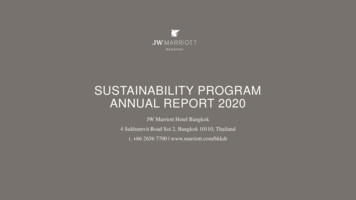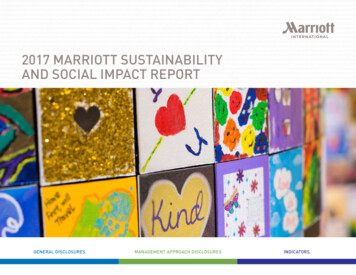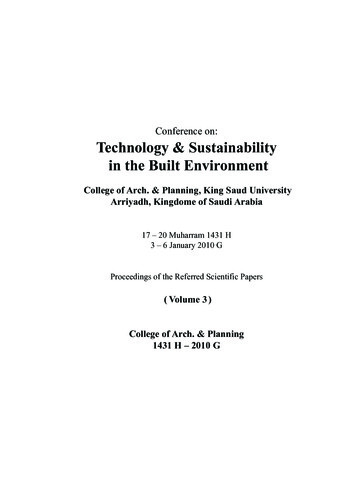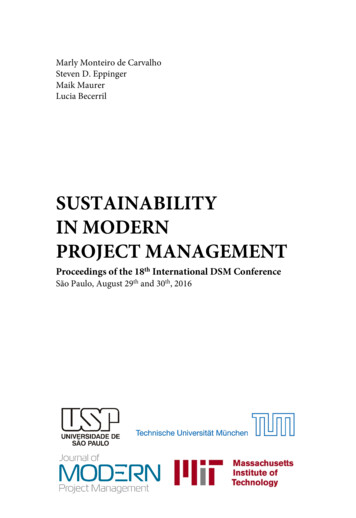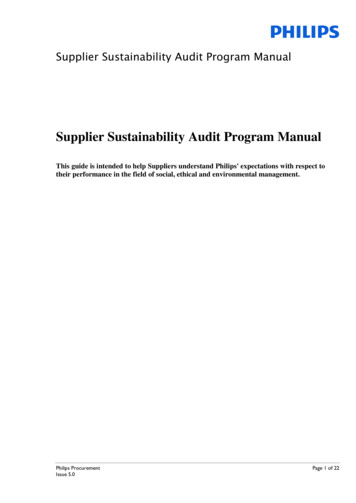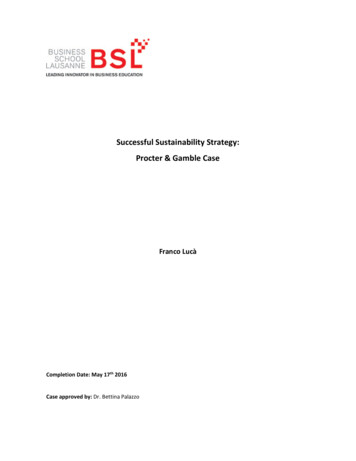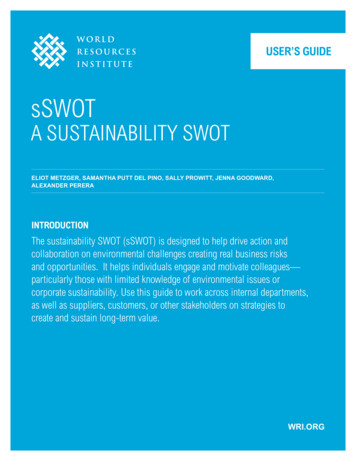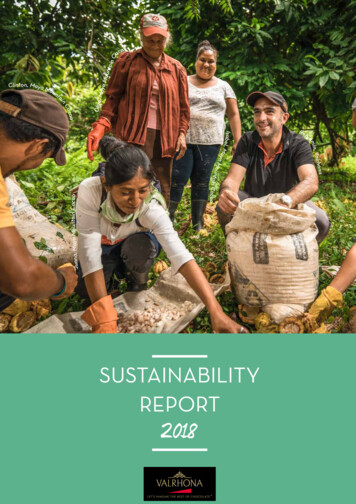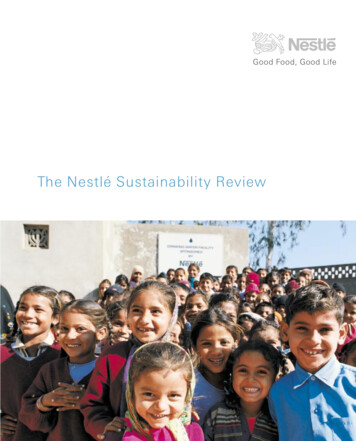
Transcription
Good Food, Good LifeThe Nestlé Sustainability Review
Contents2Quality Food Products and Sustainable Development4Our Principles, Values and Culture5 The Nestlé Corporate Business Principles5 The Nestlé Corporate Governance Principles6 The Basic Nestlé Management and Leadership Principles7 Auditing Adherence to the Nestlé CorporateBusiness Principles8Sustainable Economic Performance and Development9 Long term Reliable Returns for Shareholders10 Investor Relations10 Impact on Food Production and National Economies14 Food Business and Agricultural Development:Investment in Human Capacity15 Purchase of Agricultural Raw Materials18Sustainable Environmental Practices19 Environment Progress Report 200019 Integrated Approach Throughout the Supply Chain21 Water as a Key Priority25 Systematic Management of Environmental Performance26Sustainable Social Development27 Relationships with our Employees27 Long term relationships27 Training, transfer of technologyand accumulated know-how28 Safe work environments29 Nestlé labour and employment practices30 Right to association31 Safeguarding employment during restructuring31 Child labour32Relationships with our Suppliersand Business Partners32 Audits of industrial suppliers32 Anti-corruption measures33Relationships with Consumers and Society33 Quality, safety and nutritional value36 Research and innovation for food safety,quality and enhanced well-being37 Listening to consumers40 Advertising to consumers and children41 Marketing of breast-milk substitutes41 Infant formula marketing audits4446Involvement in CommunitiesThe Future
Quality Food Products andSustainable DevelopmentAt Nestlé, we define sustainable development as the processof increasing the world’s access to higher quality food, whilecontributing to long term social and economic development,and preserving the environment for future generations.In the 135-year life of Nestlé, our fundamental approach tobusiness has been the creation of long term sustainable valuefor our consumers, customers, employees, shareholders, andsociety as a whole. The Nestlé Corporate Business Principlesstate openly that we favour long term business development overshort term profit. While we are committed to making a healthyprofit, we instruct managers not to do so at the expense of longterm, sustainable development.
As we move ahead in the 21st century, we believethat a business strategy based on high-quality foodand beverage products can only be maintainedby business practices based on the principles oflong term sustainable development.In this report we attempt to describe how we practiceand implement the principles of sustainabledevelopment where we have direct influence andimpact on economies, societies and environments.For everyone in our company, our responsibilities andvalues are reflected in our commitment to theNestlé Corporate Business Principles. These set outthe basic rules we follow to make sure we maintainthe highest standards of conduct. This reportpresents some key performance measures andfigures, and shows how we endeavour to put ourPrinciples into practice.In meeting our commitment to be a leader insustainable development, we build on twoof the essential pillars of our long term strategy:innovation-renovation and operational efficiency.We innovate in new products and technologiesto meet the present and future needs of ourconsumers in an increasingly sustainable manner,and we improve or renovate existing products andtechnologies for the same reasons. We are dedicatedto continuous improvement in the efficient use ofresources, resulting not only in lower operatingcosts, but also in a lower impact on the environment.Managing our activities in accordance withthe principles of sustainable development makesgood business sense.Given the company’s focus on high quality, foodsafety, nutritional value, and consumer appeal, Nestléneeds to purchase high-quality agricultural goodsproduced in a sustainable way. Even though we ownno agricultural land, our approach has been, throughtechnical assistance, to improve the farming methodsand standard of living of millions of farmers.This is Nestlé’s initial effort to report on sustainabledevelopment, attempting to describe our impacton the well-being of people and the planet. As such,it is a step on a journey, as opposed to an endpoint in itself. In addition, we have produced moredetailed reports, entitled Environment ProgressReport 2000 and Nestlé in the Community, andour annual Management Report providesdetails on financial performance. You will findinformation on these and other publications at theend of this report.We are committed to being open and transparent,and to listening to the views of others as we moveforward in sustainable development. For this reason,we invite you to use the enclosed card or to write tous (www.nestle.com) with any comments andsuggestions you may have after reading this report.Peter Brabeck-LetmatheChief Executive Officer3
Our Principles,Valuesand CultureOur values and principles are elaborated in the NestléCorporate Business Principles. These were issued in 1998 andupdated in 2002 in order to integrate all existing businessprinciples at Nestlé into one single document, nowincorporating our Corporate Governance Principles.The updated version includes all nine principles ofthe UN Secretary-General’s Global Compact, regardinglabour standards, human rights, and the environment.
Nestlé Sustainability ReviewThe Nestlé CorporateBusiness PrinciplesThe Nestlé Corporate GovernancePrinciplesSome of the basic Nestlé values and principles are:The Principles incorporate our official NestléCorporate Governance Principles, which coverfour essential areas: the rights and responsibilitiesof shareholders; the equitable treatmentof shareholders; the duties and responsibilitiesof the Board of Directors; and disclosureand transparency.— Favouring long term development over short termprofit;— Long term commitments and relationships;— Respect for and integration with diverse cultures;— Proper conduct and ethical values as basicrequirements for our management and employees;— Recognition that consumers deserve informationabout the products they buy and the companybehind the brand.These Principles have been translated into overforty languages and all Nestlé managers are requiredto know and abide by them. They are incorporatedinto our ongoing training programmes, particularlyfor new employees.Topics covered in the Nestlé Corporate BusinessPrinciples include: national legislation andinternational recommendations; consumers; childrenas consumers; infant health and nutrition; humanrights; human resources and the workplace; childlabour; business partners; conflicts of interest;relationships with suppliers; competition; externalrelations; protection of the environment; water policy;agricultural raw materials; and compliance.Members of the Nestlé Board of Directors arenominated and carry out their duties accordingto Swiss law. The Board has a high degreeof independence, as all are non-executive members,with the exception of the “administrateur délégué“(CEO), the Board member delegated to activelymanage the company.Regarding public disclosure, the Financial Statementsof the Nestlé Management Report 2001 includemore detailed information on the remuneration ofmembers of the Nestlé Board of Directors and theNestlé Executive Management Group.The Board is also ultimately responsible foroverseeing and implementing all the NestléCorporate Business Principles. It is worth notingthat Mr Stephan Schmidheiny, one of the membersof the Nestlé Board, is also one of the foundersof the World Business Council for SustainableDevelopment, a leading organisationin environmental matters.Nestlé is registered in Switzerland and governedunder Swiss company law. While shareholdersof Swiss companies have to meet greaterrequirements for introducing shareholder resolutionsthan in some other countries, Nestlé shareholdersexercise a number of additional rights in comparisonwith shareholders of companies registered in manyother countries. For example:5
Our Principles, Values and Culture— Shareholders decide on the appropriationof profits resulting from the balance sheetof Nestlé S.A. and, in particular, they determinethe amount of the dividend;— Shareholders adopt and amend the Articlesof Association;— Shareholders can place items on the agenda andask questions at General Meetings in accordancewith the Articles of Association.Nestlé applies the principle of “one share – one vote“up to a maximum of 3% of the total shares(at the time of the publication of this review, no oneshareholder owned more than 3% of the totalamount of Nestlé shares). This helps to protect thelarge number of small Nestlé shareholders againstpotential pressure coming from a small number oflarge shareholders.The Basic Nestlé Managementand Leadership PrinciplesA companion document to the Principles is The BasicNestlé Management and Leadership Principlesdocument. Developed in 1997, this importantdocument lays out the fundamental guiding principlesfor management behaviour, selection and promotion.This document summarises the essential basicelements of Nestlé culture.It also helps avoid hostile take-overs of the company,thereby maintaining and safeguarding a system ofsocial values built up by our company over decadesof business activity.Dow JonesSustainability IndexNestlé S.A. is includedin the Dow JonesSustainability Index.This Index includesabout 200 companiesthat represent the top10% of the leadingsustainability companies6in 64 industry groupsfrom 33 countries. Thecompanies are selectedby a systematicassessment of corporatesustainability practices.Companies included inthe index actively leadtheir industries andset industry-wide bestpractices in: Strategy,Innovation, Governance,and relationships withshareholders, employeesand other stakeholders.
Auditing Adherence to the NestléCorporate Business PrinciplesWith some 200 local internal auditors in the markets,and a team of 25 corporate auditors reportingto the Head of Auditing at our internationalheadquarters, we have a system in place whichallows us to continuously monitor that the NestléCorporate Business Principles are beingimplemented in all the countries where we operate.The Principles are published on the Nestlé Intranetsite so that all employees can read and understandthe criteria used.The corporate auditors travel continuously fromcountry to country and visit all Nestlé factories, localhead offices, distribution centres and sales officeson a systematic basis. Audit findings are reportedto the Head of Corporate Auditing and the CEOof Nestlé S.A., as well as the person responsible forthe Nestlé market or the respective countrymanager. The Audit Committee of the Nestlé Boardof Directors is informed of all significant findings.These internal auditing procedures for the Principleshave been verified by our external auditors, KPMG.NESTLÉ CARRIES OUT ITS GLOBAL RESPONSIBILITYBY TAKING A LONG TERM APPROACH TO STRATEGICDECISION-MAKING THAT RECOGNISES THE INTERESTSOF OUR CONSUMERS, SHAREHOLDERS, BUSINESSPARTNERS, AND THE WORLD-WIDE ECONOMIESIN WHICH IT OPERATES.Extract from the Nestlé Corporate Business Principles7
Sustainable EconomicPerformance and DevelopmentA key feature of Nestlé’s approach is to locate aspects ofproduction in the developing world, rather than to simplysource raw materials there. 45% of our factories are situated insuch countries, and 48% of our employees are located indeveloping countries, even though these countries representless than a third of our sales. Nestlé has publicly stated that afundamental principle of its economic investments is thatthey should be “good for the country and good for thecompany“. In this way Nestlé seeks to be a true partner insustainable development.
Nestlé’s fundamental purpose is to meet the needsof its customers and consumers for quality foodproducts that offer value for money. By doing thissuccessfully, we generate long term, sustainableeconomic results and development for all those witha stake in the business. With factories locatedin more than 80 countries, and with Nestlé companiesin virtually every country in the world, the effectsof our business development are felt by economiesaround the globe.This occurs in different ways. For example, throughtechnology transfer, through apprentice programmesand training local employees to internationalstandards, as well as by paying taxes which helpfund local infrastructure construction, Nestléis contributing to sustainable economic developmentaround the world and at the same time improvingthe quality of foods that are locally available.Nestlé ranked inworld’s top15 companies in theWealth Added Index*According to SternStewart’s WealthAdded Index (WAI),Nestlé is among the top15 companiesworldwide in creatingshareholder wealth ina ranking of the 5069largest quotedcompanies. SternStewart calculates thatbetween June 1996 andJune 2001 Nestlé’swealth added toshareholders amountedto USD 43.8 billion.Central to the WAIrankings is the idea thatcompanies create valuefor shareholders onlyif their returns toinvestors – from shareprice rises anddividends – exceed thatof their “costof equity“, definedas the minimum returnthat investors requirefor putting their moneyin shares of stock,rather than in minimumrisk alternatives suchas government bonds.Long Term Reliable Returnsfor ShareholdersAt Nestlé, we are committed to the sustainableincrease in the value of our shares, and our shareprice has experienced an eighteen-fold increase overthe last 20 years. From 1970 to 2000 Nestlé sharesoutperformed the Morgan Stanley Capital Indexof Swiss blue chip stock companies by over 250%and the Morgan Stanley World Blue Chip Stock Indexin USD terms by 25%.For decades, Nestlé has had consistent, stable andaccelerated growth in overall turnover. In termsof current performance, the year 2001 was onceagain a record year for sales, n
Nestlé Management and Leadership Principles document. Developed in 1997, this important document lays out the fundamental guiding principles for management behaviour, selection and promotion. This document summarises the essential basic elements of Nestlé culture. 6 Our Principles, Values and Culture The Basic Nestlé Management and Leadership PrinciplesFile Size: 2MBPage Count: 51
